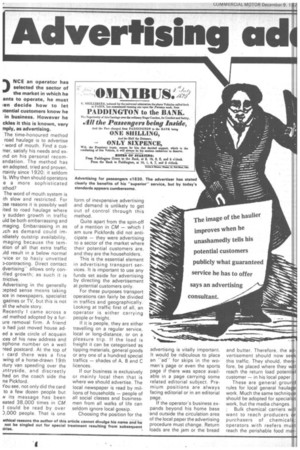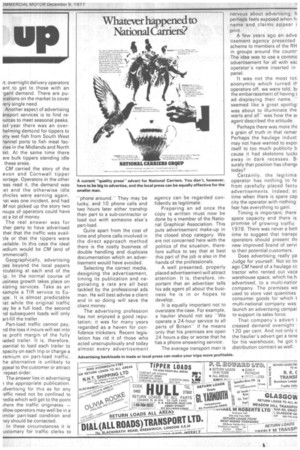Advertising ad up
Page 52

Page 53

If you've noticed an error in this article please click here to report it so we can fix it.
)NCE an operator has selected the sector of the market in which he ants to operate, he must len decide how to let nential customers know he in business. However he
ckles it this is known, very rnply, as advertising.
The time-honoured method road haulage is to advertise . word of mouth. Find a cusrner, satisfy his needs and exind on his personal recomendation. The method has en adopted, tried and proven, rtainly since 1920; it seldom Is. Why then should operators e a more sophisticated .1thod?
The word of mouth system is th slow and restricted. For )se reasons it is possibly well ited to road haulage where y sudden growth in traffic uld be both embarrassing and maging. Embarrassing in as ich as demand could imKliately outstrip availability, maging because the ternition of all that extra traffic Jld result in a below normal 'vice or to hasty unveiled 3-contracting. Direct contact dvertising" allows only condied growth; as such it is itrictive.
Advertising in the generally ;epted sense means taking ice in newspapers, specialist gazines or TV, but this is not III the whole story.
Recently I came across a /el method adopted by a furure removal firm. A friend o had just moved house aded a wide circle of acquain ices of his new address and ephone number on a well rited postcard. At the top of i card there was a fine wing of a horse-drawn 19th itury van speeding over the J ntrys i d e , and discreetly hed on the coach side the ne Pickford.
Ifou see, not only did the card to a few dozen people but N its message has been eated 38,000 times in CM i could be read by over 1000 people. That is one
form of inexpensive advertising and demand is unlikely to get out of control through this method.
Quite apart from the spin-off of a mention in CM — which I am sure Pickfords did not anticipate — they were advertising to a sector of the market where their potential customers are, and they are the householders.
This is the essential element in advertising transport services. It is important to use any funds set aside for advertising by directing the advertisement at potential customers only.
For these purposes transport operations can fairly be divided in traffics and geographically. Looking at traffic first of all, an operator is either carrying people or freight.
If it is people, they are either travelling on a regular service, local or long-distance, or on a pleasure trip. If the load is freight it can be categorised as tipping materials, general goods or any one of a hundred special traffics — shades of A, B and C licences.
If our business is exclusively or mainly local then that is where we should advertise. The local newspaper is read by millions of households — people of all social classes and businessmen from all walks of life can seldom ignore local gossip.
Choosing the position for the advertising is vitally important. It would be ridiculous to place an "ad" for skips in the woman's page or even the sports page if there was space available in a page carrying some related editorial subject. Premium positions are always facing editorial or in an editorial page.
If the operator's business expands beyond his home base and outside the circulation area of the local paper the advertising procedure must change. Return loads are the jam or the bread and butter. Therefore, the a vertisement should now se this traffic. They should, the fore, be placed where they reach the return load potent customer — in his local paper.
These are general grou rules for local general haula work. Much the same techniq should be adopted for special work, but the media changes.
; Bulk chemical carriers want to reach producers purchasers of chemical operators with reefers mu reach the perishable food m
t; overnight delivery operators ant to get to those with an 'gent demand. There are puications on the market to cover lery single need.
Another aspect of advertising 3nsport services is to find reiurces to meet seasonal peaks. 1st year there was an overhelming dernE-,nd for tippers to irry wet fish from South West hannel ports to fish meal faciries in the Midlands and North )st. At the same time there ere bulk tippers standing idle these areas.
CM carried the story of the even and Cornwall tipper lortag.e. Operators in the other .eas read it, the demand was let and the otherwise idle ahicles were earning again. at was one incident, and had M not picked up the story two roups of operators could have ist a lot of money.
The real answer was for ther party to have advertised ther that the traffic was availDie or that the tippers were iailable. In this case the ideal iedium would be CM (end of )mmercial!).
Geographically, advertising pes beyond the local papers rculating at each end of the ip. In the normal course of usiness growth takes place on Kisting services. Take as an Kemple a TIR service to Eu)pe. It is almost predictable at while the original traffic 'ay be a full load, the second id subsequent loads will only art-fill the trailer.
Part-load traffic cannot pay, rid the loss it incurs will eat into ie profit margin of the fully iaded trailer. It is, therefore, 3sential to load each trailer to apacity on each trip or 'charge a remium on part-load traffic. he alternative is unlikely to ppeal to the customer or attract repeat order.
The answer lies in advertising the appropriate publication.
idvertising for this as for any -attic need not be confined to
ledia which will get to the point /here the traffic originates — allow operators may well be in a imilar part-load condition and ley should be contacted.
In these circumstances it is ustomary for traffic clerks to "phone around." They may be lucky, and 10 phone calls and two hours later either tranship their part to a sub-contractor or load out with someone else's part-load.
Quite apart from the cost of time and phone calls involved in the direct approach method there is the costly business of double handling and duplicate documentation which an advertisement would have avoided.
Selecting the correct media, designing the advertisement, timing its publication and negotiating a rate are all best tackled by the professional ads man. He will best advise a client and in so doing will save the client money.
The advertising profession has not enjoyed a good reputation; it was for many years regarded as a haven for confidence tricksters. Recent legislation has rid it of those who acted unscrupulously and today almost every advertisement agency can be regarded confidently as legitimate.
Preparing an ad once the copy is written must now be done by a member of the National Graphical Association. This puts advertisement make-up in the closed shop category. We are not concerned here with the politics of the situation, therefore suffice to say that at best this part of the job is also in the hands of the professionals.
A well presented, properly placed advertisement will attract attention. It is, therefore, important that an advertiser tells his ads agent all about the business he is in or hopes to develop.
It is equally important not to overstate the case. For example, a haulier should not say "We operate a 24-hour service to all parts of Britain" if he means only that his premises are open 24 hours a day or worse that he has a phone answering service.
The average transport man is nervous about advertising; h perhaps feels exposed when hi name and claims appear i print.
A few years ago an adve tisement agency presented scheme to members of the RH in groups around the countr The idea was to use a comma advertisement for all with eac operator's name inserted in panel.
It was not the most toe anonymity which turned 0operators off, we were told, bi the embarrassment of having ad displaying their name. seemed like a great spotligl was about to illuminate the warts and allwas how the agent described the attitude.
Perhaps there was more thE a grain of truth in that rernar Perhaps the haulage indust may not have wanted to expo: itself to too much publicity b cause it had skeletons tuckE away in dark recesses. Bi surely that position has changE today?
Certainly, the legitirna operator has nothing to fe from carefully placed factu advertisements. Indeed, at time when there is spare cap city the operator with nothing fear has everything to gain.
Timing is important; there spare capacity and there is promise of growing traffic 1978. There was never a bett time to suggest that transpc operators should present thE new improved brand of servi to their potential customers.
Does advertising really pa Judge for yourself. Not so loi ago CM heard of a haulage cc tractor who rented out vaca warehouse space, which he hi advertised, to a multi-natior company. The premises we used to store vast quantities consumer goods for which t multi-national company was launch an advertising campai to support its sales force.
That company's advert i creased demand overnight 120 per cent. And not only c the haulier's advert get a tena for his warehouse, he got t distribution contract as well.




































































































